
Aqui está uma ótima entrevista com David Knopfler, traduzido gentilmente por Renata, uma grande fã do Dire Straits! ^^
Entrevista com David Knopfler, Dezembro de 2007
2008 marca o 25° aniversário do álbum de estréia de David Knopfler, Release...
Rob Quicke: David, obrigado por estar aqui com a gente no Britsound.
David Knopfler: É um grande prazer estar aqui, obrigado.
RQ: Você está prestes a viajar para a Austrália.
DK: Realmente.
RQ: E a fazer uma turnê. È a primeira vez que você vai tocar na Austrália?
DK: Você sabe que sim. Dá medo pensar nisso, mas eu nunca toquei lá. Realmente, é a primeira vez que vou tocar na Austrália, sim. No entanto, deve ser muito empolgante porque isso será muito novo e muito revigorante. Como ser um principiante outra vez.
RQ: Como você se sente ao ir a lugares onde você nunca tocou antes? Que tipo de reação você espera?
DK: È muito diferente. Quero dizer que quando me apresento na Europa eu já tenho um perfil e as pessoas já me viram na TV. Já fiz rádio e tudo mais. Mas quando toco em outro lugar como os Estados Unidos, Canadá ou Austrália, é como voltar para o início. É preciso voltar atrás e explicar que você é o cara que fundou o Dire Straits e que realmente já gravei dez álbuns. Você realmente começa do zero a cada vez..
RQ: Isso é um peso?
DK: Não, tudo bem, quer dizer, a obra é a mesma. Quando se está no palco, é meio engraçado porque você pode dizer: “Esta é uma música do meu novo álbum”, e não saberão se é do disco novo ou antigo porque não têm nenhum dos álbuns. A gente realmente toca para uma platéia nova. É um desafio, mas também é divertido.
RQ: Isso é algo que ficou mais fácil com o passar dos anos?
DK:É, suponho que sim. Quer dizer, você ainda fica nervoso antes do show do mesmo jeito, mas coloca isso dentro de uma caixa para não te enfraquecer de nenhuma maneira ou em nada.
RQ: Vamos falar do ano que vem (2008) porque este ano marca o 25° aniversário de Release, seu álbum de estreia.
DK: Sim, pensei que eu poderia lançar um the Best Of em homenagem a isso. Pensei que ia ser uma coletânea. Realmente serão 25 anos de 1983 a 2008.
RQ: Agora deixa eu te levar para 25 anos atrás. O que você lembra de fazer este álbum de estréia?
DK: Foi uma emoção. Quer dizer, é fantástico finalmente lançar o primeiro disco, não é? Eu quis uma capa dupla (gatefold), tive meu fotógrafo favorito e era um álbum single. Foi simplesmente empolgante. É como ganhar uma espécie de troféu na verdade. Senti uma maior emoção com isso do que com todos os discos de platina dos Straits que já estavam empilhados no porão.
RQ: Obviamente, foi muito importante porque você estava “partindo para outra” até certo ponto?
DK: Bem, não me pareceu assim. Eu senti como se eu estivesse voltando para outro lugar... onde eu fechasse o hiato de três anos enquanto estive nos Straits. Mas sim comercialmente falando, eu me dei mal. Essa é uma interpretação infeliz.
RQ: Você fez dez álbuns até o momento. E quero conversar com você sobre esses álbuns, sobre sua viagem por dez discos. Quero falar sobre algo que ocorreu entre 1991 e 1993. Em 91, você lançou Lifelines gravado no Real World Studios…
DK: Um álbum de rock 'n' roll. Meu último álbum de rock 'n' roll.
RQ: É, muito elétrico, com uma grande produção também...
DK: Tinha um grande som, uma grande bateria, muito dinheiro e muita pré-produção também.
RQ: Mas dois anos depois você lançou The Giver, que foi completamente diferente em termos de técnica e produção. O que aconteceu neste tempo para causar essa mudança?
DK: Estava trabalhando no Lifelines com um compositor chamado David Arnold, que depois teve fama e fez fortuna em Hollywood criando trilhas sonoras, mas na época ele era meu assistente de produção. Nós simplesmente ficamos sentados programando o chimbal (high hat), o que estava demorando uma eternidade. Levamos uns três dias programando-o. Não acabava. Pensei que a coisa nunca ia terminar, sabe. Fiquei mesmo cansado e de saco cheio disso. Fiquei pensando: qual é o problema? Isso é uma loucura. Um baterista real leva cinco minutos para colocar a parte da bateria e passamos dias embromando com isso. Fiz uma promessa na época, quando levamos quatro meses na pré-produção, de que eu nunca mais passaria seis meses fazendo um disco. Eu levaria seis semanas e é o que acontece desde então.
Eu acho que o The Giver provavelmente foi feito em quatro ou cinco semanas. E sabe, a gente leva uns três ou quatro dias ensaiando com a banda. È possível que as faixas de playback fiquem prontas em menos de uma semana. Depois os overdubs são feitos em uma semana e a mixagem é feita em uma semana e fica muito bom em três ou quatro semanas, o que na verdade foi o que levou o primeiro álbum do Dire Straits. Acho que tivemos um orçamento de 12.000 libras, o que na época equivalia a £ 18. 000 e três semanas para fazê-lo. Não acho que ele soe pior por isso, sabe. A gente continua desse jeito.
RQ: Soa muito mais orgânico, muito mais “natural” por assim dizer.
DK :Alguns dos discos dos meus ídolos para os quais eu muitas vezes volto de tempos em tempos como Blood On The Tracks, do Dylan ou Saint Dominic’s Preview,do Van Morrison ou um desses tipos de álbum. Quer dizer, eles são álbuns da metade dos anos 70 que foram bem produzidos, mas são meio eternos em termos de produção porque consequentemente eles não têm data. Discos que muitas vezes são feitos com muita bateria eletrônica e sintetizadores são simplesmente... eles tendem a durar apenas duas semanas e a gente começa a desejar não tê-los feito assim.. A gente calmamente se arrepende deles.
RQ: Deixa eu te perguntar uma coisa sobre os álbuns anteriores ao The Giver. Você tem orgulho deles?
DK: Nos primeiros nove álbuns, acho que houve uma curva geral de aperfeiçoamento na minha obra. Acho que a composição das canções está melhor, a produção está melhor. Talvez eu tenha errado um pouquinho no álbum 10, mas esse foi uma experiência. De qualquer modo, considero que a composição está melhorando independentemente da produção. Sinto como se ainda estivesse me aprimorando. Enquanto seja esse o caso, vou continuar a fazê-los.
RQ: Uma vez numa entrevista você disse que “a possibilidade de eu me tornar um artista comercial agora escapa à minha consciência”.
DK: Sim, sem dúvida.
RQ: É algo que sempre foi sua intenção?
DK: Ser um artista comercial?
RQ: Não. Evitar ser comercial?
DK: [risos] Talvez seja mais o segundo (caso)! Bem, nenhum dos dois na realidade. Na verdade, simplesmente é preciso fazer o trabalho do qual gostamos. Não me surpreendeu que quando eu passei do álbum 5, Lifelines para o álbum 6, The Giver, da produção do Real World studios para a produção acústica — não me surpreendeu que as minhas vendas diminuíssem em até cerca de 75% em consequência dessa mudança.Ou melhor, grande parte do público central do rock hardcore principalmente na Alemanha na verdade não entendeu, sabe.
RQ: É mesmo?
DK: Lá, as vendas caíram de cerca de 50.000 unidades para aproximadamente 20.000, mas sabe está ok. A gente faz o que deve fazer. A gente não pode fazer discos para agradar a outras pessoas. É preciso agradar a si mesmo primeiro e acima de tudo. E não sinto nenhuma grande vontade de voltar ao som das “grandes baterias” dos anos 80. Isso não me interessa. Eu realmente meio que continuo fiel ao espírito e ao etos da composição que ao meu redor quando eu cresci, que eram os da Asylum Label e tudo em que eles acreditavam e toda aquela coisa do compositor cantor da década de 70. Na verdade, é onde meu coração ainda está e na verdade, eu nunca quis ir muito além disso. Acho que é isso que me empolga e que define as minhas aspirações, penso.
RQ: Uma vez você disse numa entrevista que trabalha nas margens e é nelas que você encontra gente boa. Encontra verdadeiros amigos. Encontra honestidade.
DK: E as margens são largas também. Elas são mais largas do que as pessoas fazem você acreditar, digo politicamente falando. Quando Bush e seus amigos assumiram, nós fomos meio que ludibriados para acreditar que essa forma muitíssimo extrema de neoconservadorismo era um fenômeno aceito pela sociedade, o que certamente não é verdade. As margens disso são enormes. Eu diria que a grande maioria dos americanos e todos no planeta basicamente não concordam com esses valores. O que quero dizer é que não tenho problema em ficar na margem. Podem fazer com que a pessoa se sinta marginalizada, mas na verdade, ela não está. Simplesmente os interesses coletivos pregaram uma placa de madeira que diz “você não pode andar aqui”, mas você ainda pode fazer seu trabalho. Para ser sincero, não acredito que esse tipo de coisa coletiva funcione no fim das contas de qualquer maneira. Mais cedo ou mais tarde ela explode porque não dá as pessoas o que elas realmente desejam.
RQ: No entanto, deixa eu te perguntar sobre isso. Você acha que em muitos aspectos a razão pela qual você pode continuar a fazer a sua música é a Internet e o boca a boca on-line?
DK: Não sei para ser franco. Essa é a resposta honesta. Acho que a internet ajudou em alguns pontos e prejudicou em outros. A clonagem, o download , o CDR e todo o resto foram o tiro de misericórdia nos CDs e no meio para a pessoa se sustentar desse jeito. Mas a internet criou um ímpeto enorme para as pessoas se tornarem conhecidas, tocarem ao vivo e se apresentarem com honestidade, o que talvez seja bom. Isso não pareceu desestimular os artistas mais jovens a aparecer em qualquer formato ou forma. É mais difícil se sustentar agora, mas ela matou todos os excessos dos ricos ocorridos nos anos 80 estimulados pela cocaína, o que provavelmente não é ruim. Eu realmente não sei. Teria sido muito bom se os direitos autorais pudessem ter sido protegidos, mas é tarde demais para se preocupar com isso agora. As gravadoras deviam ter sido proativas a respeito disso há quinze anos, mas não foram.
RQ: Deixa eu te fazer uma pergunta sobre o seu site knopfler.com. O motivo pelo qual eu adoro seu site é que ele parece uma loja de antiguidades.
DK: Uma parte do conteúdo é bem antiga! Grande parte foi escrita na década de 90 e simplesmente nunca foi atualizada.
RQ: A razão pela qual eu gosto tanto do site é que ele é cheio de materiais tão interessantes e alguns deles são extremamente incomuns. Era essa a sua intenção?
DK: Esta não era a minha intenção. O site simplesmente mudou. Na época em que peguei o nome não havia uma cobrança para se ter um nome de domínio. Podia-se simplesmente pegá-lo.
RQ: UAU!
DK: Ou melhor, eu quase juntei um deles como cars.com e hotels.com.
RQ: Bem, agora você seria um milionário.
DK: Pensei: o que eu vou fazer com tudo isso? Por isso não peguei. E agora vendem por um milhão de dólares cada um É assim que as coisas são. Eu simplesmente criei o site porque acima de tudo eu precisava de um veículo para meus fãs e em segundo lugar porque necessitava de um veículo para vender cds em regiões onde eu não tinha nenhum selo. Na época havia um mercado cinza onde pequenos selos produziam, distribuíam e lançavam discos, sem ter o direito de fazer isso. Eu podia ter um contrato de licenciamento de três anos e essas gravadoras lançavam os álbuns 10, 15, 20 anos depois. A menos que eu os lançasse por conta própria e distribuísse meu trabalho lá nessas margens essas gravadoras continuariam a explorá-lo para sempre e eu nunca veria os direitos autorais e era um jeito de parar com isso também. Eu já tinha o meu selo com a Paris Records desde o Release. Na verdade eu o lancei com meu próprio selo em alguns países de qualquer maneira. Eu tinha alguns selos principais em algumas grandes regiões, mas muito ocorreu do jeito FVM – Faça você mesmo. É um processo contínuo de vender meus próprios discos realmente.
RQ:Ouvindo o último álbum do seu irmão, Kill To Get Crimson…
DK: Eu realmente não ouvi o cd, então não posso fazer nenhum comentário a respeito.
RQ: Certo. Mas seu irmão voltou para um estilo que em muitos aspectos é a música que você estava fazendo há quase 15 anos com o The Giver, canções simples e com base no acústico…
DK: Eu estava esperando que fosse algo que ele fizesse de tal forma que me soasse promissor, mas isso depende se as músicas são boas no fim das contas. Eu não ouvi o disco então não posso comentar.
RQ: Certamente. Mas não é irônico porque é a música que você estava fazendo há quase 15 anos?
DK: Não estou competindo com ninguém.
RQ: Certo.
DK: Muito menos com meu irmão. As pessoas devem fazer seu trabalho do jeito que quiserem, sabe. Quero dizer, não é porque somos família que temos que competir. Ou melhor, não estou competindo com ninguém. Estou só fazendo o meu trabalho e gostando disso. Tenho muito respeito pelo talento do Mark como artista. Acho que ele é um guitarrista ótimo, excelente. E sem esse talento, eu certamente não teria me sustentado com o Dire Straits.
RQ: Em todas as suas entrevistas que li você parece realmente feliz por ter saído do Dire Straits.
DK: É, mais do que isso com certeza. Eu nunca me arrependi de ter feito algo quanto se trata de tomar decisões e seguir em frente. Quer dizer, larguei vários empregos na época anterior ao Dire Straits quando eu tinha um emprego fixo. Eu saía quando o trabalho não me fazia feliz. A vida é uma só. A pessoa seria boba se passasse o dia com algo que não a faz feliz ou se dedilhasse para os sonhos de outro se ela tem seu próprio sonho.
RQ: Vou fazer aquela pergunta. Muitas bandas estão voltando a se reunir e trabalhando com quem não tocavam há anos…
DK: Eu faria isso com emoção. Estou com muita inveja do Stewart Copeland e do Andy Summers. Acho que é uma idéia fantástica; eu faria isso amanhã. Uma turnê? É. Eu seguiria o conselho do meu melhor amigo Harry: Eu sairia, não falaria nada e continuaria a não dizer, mas, claro, eu tocaria por tocar, me divertiria e faria isso por um mês. Não acredito muito em dar voltas numa roda para hamster para ser feliz amanhã, mas também não sou completamente idiota. Se alguém te dissesse: “você gostaria de ganhar 10 milhões de dólares e você só levaria um mês para conseguir isso”, você seria maluco se dissesse não. Mas ninguém nunca vai me fazer essa pergunta. Isso nunca vai acontecer. Eu posso brincar com isso porque sei que o Mark não vai fazer isso de jeito nenhum.
RQ: Mas não é interessante que muitos fãs afirmem que os dois primeiros álbuns do Dire Straits, Dire Straits e Communiqué, são o “verdadeiro” Dire Straits?
DK: É, não sei. Eu também gosto de algumas das outras músicas. Eu realmente também recebo muito desse feedback Mas é isso que as pessoas querem que eu ouça, não é ?
RQ: Suponho que sim.
DK: A gente não ia querer ouvir as pessoas dizendo: “Bem, essas músicas eram muito ruins, mas quando eles chegaram ao Brothers in Arms foi quando o Dire Straits realmente arrebentou”. Era diferente. Foi uma era. Era uma música muito ingênua da época.
RQ: Vamos falar do futuro. Você vai para a Austrália. Quais são seus planos quando voltar de lá?
DK: Vou tirar umas férias curtas e então vou passar mais tempo no sol, o que seria legal. Depois vou fazer uma turnê na Europa em fevereiro ou março de 2008 com a banda. Na Austrália somos só eu e o Harry, o que é bem divertido porque não teremos a equipe e podemos simplesmente alugar um 4 X 4 e andar por conta própria e começar e parar quando a gente quiser. E então teremos algo mais orquestrado em fevereiro/março quando teremos o empresário da turnê, equipe e o promoter, que tomam conta da gente. Faremos isso e depois provavelmente vou para o estúdio com o Harry para fazer outro álbum. Acho que vamos tentar fazer um disco acústico.
Recentemente, eu estive em Nashville, voltei a trabalhar com Max Starks e escrevemos algumas canções realmente boas que eu gostaria de testar e gravar. Se eu conseguir arrumar dinheiro, talvez eu vá a Nashville eu faça algum trabalho lá e também uma parte do álbum. Tentar gravar um disco hoje em dia quando não há uma base de vendas nem adiantamentos nem um jeito de financiá-lo é uma luta se você não tem orçamento para isso. As pessoas estão hipotecando a casa de novo para gravar discos e isso realmente não faz sentido.
RQ: Mas parece que você está fazendo um álbum que pode ser ainda mais simples em termos de som?
DK: Exatamente. Acho que esse é o caminho a seguir. Acho que vou diminuir para três microfones e duas guitarras.
RQ: Mas alguns artistas realmente temem isso. Alguns artistas teriam medo de serem tão expostos.
DK: Claro, é mais difícil. Quanto menor o show, mais difícil fica. .A gente tem menos trabalho com banda. Recentemente, eu fiz uma turnê com uma banda muito grande, com doze ou quatorze artistas e eu era apenas uma pequena parte de uma grande engrenagem, sabe. Eu tinha umas duas músicas minhas. Era como uma dessas bandas de festivais que reúnem várias estrelas na Europa com uma grande bateria dupla (duas grandes baterias) e toda aquela besteira. Muita pompa e circunstância. A gente pode parar de tocar numa banda como essa que ninguém vai notar. Isso não vai importar. Houve um acorde aumentado estranho e eu virei para o arranjador e perguntei: “Que acorde é esse?” E ele respondeu: Não tenho a menor idéia. Simplesmente encontre a nota adequada e toque-a. Eu virei para o organista Hammond, Tony, e disse: “O que você está fazendo?” Ele respondeu: “É exatamente isso que eu estou fazendo”.
Eu perguntei a três músicos diferentes. Não conseguimos encontrar o acorde e toquei uma nota dele e estava bom. A coisa era tão grande e numerosa. É difícil ouvir um músico. Quando é só você e a guitarra lá no palco ou você e o piano, você não tem onde cair. Você está na corda bamba e não tem rede de proteção. Por isso, sim, é preciso ser muito mais corajoso para gravar um disco e se apresentar ao vivo assim. Não são muitos os que fazem sucesso. Eu adoro ir assistir alguém como Randy Newman tocando sozinho apenas com seu piano porque as músicas dele são boas para caramba. Todas as canções do Randy Newman são boas. Quase nenhuma é ruim… a média dele de acerto e sucesso ao compor as próprias canções é muito alta. Então você pega o melhor delas e leva para o show e ele tem muita personalidade de qualquer jeito, algum tipo de genialidade mesmo, eu acho. É muito fácil gostar de algo assim. A orquestração não é necessária. Quando a gente volta aos discos dele e escuta algo como Louisiana que tem grandes cordas exuberantes, é maravilhoso de ouvir. Não é preciso ter a orquestração porque as músicas podem ser ouvidas sem isso.
RQ: Deixa eu te perguntar como é trabalhar com o Chris Rea. Eu o entrevistei há uns dois anos, um cara adorável que fez uma interessante viagem em busca de si mesmo mais recentemente. Como é trabalhar com ele?
DK: Foi fácil. O Chris é um cara muito legal e generoso que sempre meio que me apoiou. Tivemos um baterista em comum com Martin Ditchum. Eu soube pelo Martin que o Chris tinha oferecido seus serviços a qualquer momento e quando eu quis que ele tocasse guitarra no meu disco eu só tive que pedir. Então eu falei e ele se saiu bem. Nós realmente gostamos do que ele fez.. Um cara bom. No cd seguinte, na verdade, o empresário dele não queria muito que ele tocasse. Mas o Chris meio que o colocou contra a parede e disse: “Eu vou fazer isso mesmo assim!” Ele trabalhou em dois discos meus até agora. Um grande cara, o Chris.
RQ: Bem, a pergunta final. Qual seria o melhor conselho que alguém já te deu?
DK: Caramba, muitos bons conselhos. “Não diga nada e continue fazendo seu trabalho” é um conselho muito bom. “Tome conta do dinheiro”, alguém me disse uma vez. Muitas pessoas me deram bons conselhos, embora eu não os tenha seguido sempre Não sabia que conseguia sair com apenas uma frase..
RQ: Mas no geral você está muito feliz com o jeito que você é?
DK: No geral, eu gostaria de ganhar mais toneladas de dinheiro e conseguir ser criativo da mesma maneira. Não se pode ter tudo. Cada um colhe o que planta. Estou exatamente onde eu escolhi estar. Não estou reclamando de nada. Simplesmente é assim que as coisas são. Quer dizer, seria bom se o Clear Channel estivesse cheio de pessoas com idéias modernas e progressistas que realmente estão ligadas à música. Seria legal se tivéssemos um presidente que tocasse saxofone, mas mão é assim que o mundo funciona.
RQ: Isso nunca vai acontecer.
DK: Bem, aconteceu uma vez, mas geralmente um raio não cai duas vezes no mesmo lugar.
----> <--- Em inglês:(In english)
Interview von Britsound im Dezember 2007
2008 marks the 25th anniversary of David Knopfler's debut album, Release...
Rob Quicke: So David, thank you for joining us on Britsound.
David Knopfler: It's a great pleasure to be here, thanks.
RQ: You're just about to go off to Australia...
DK: I am indeed.
RQ: And do a tour. Is that the first time you've played in Australia?
DK: You know it is. It's frightening to think about, but I've never played there before. It's the first time I've ever played in Australia, yes, indeed. It should be very exciting though, because it will be very fresh and very new. Kind of like being a newbie all over again.
RQ: How do you feel about when you go to places where you've never played before? What kind of reaction do you expect?
DK: It's very different. I mean when I'm doing Europe I already have a profile and people have seen me on TV. I've done radio and all the rest of it. But when I play somewhere, like the States or Canada or Australia, it's kind of like going back to the beginning again. You have to go back and kind of explain that you were that bloke who founded Dire Straits and yes I've made ten albums. You're really starting from ground zero each time.
RQ: Is that a burden?
DK: No, it's alright. I mean, the work's the same. When you get on the stage it's kind of funny, because you can say, "This is a song from my new album", and they wouldn't know any different whether it was from a new one or an old one, because they haven't got any of your albums. You're really playing to a new crowd. You have to win them 'round. It's a challenge, but it's also fun.
RQ: Is that something that over the years has gotten easier?
DK: Yeah, I suppose it has. I mean you still get nervous before a show just the same way, but you kind of put it into a box so that it doesn't debilitate in anyway or anything.
RQ: Let's talk about next year, because next year marks the 25th anniversary of Release, your debut album.
DK: Yes, I thought that I might bring out a Best Of in honour of that. I thought it was going to be a compilation. It will be 25 years indeed, 2008, from 1983.
RQ: Now let me take you back 25 years. What do you remember about making that debut album?
DK: It was a thrill. I mean when you finally get your first record released it's a blast isn't it? I wanted a gatefold sleeve and I had my favorite photographer and it was a single album. It's just exciting. It's like kind of getting a trophy really. I got a bigger thrill from that than all the platinum discs that had already piled up in the cellar from the Straits.
RQ: Obviously, it was very important for you because you were striking out on your own to a certain extent.
DK: Well, it didn't feel like that to me. It felt like I was returning to where I'd kind of...what I'd put on hiatus for three years while I had been in the Straits. But yes, commercially speaking I was ‘striking out’. An unfortunate expression really!
RQ: You've now made ten albums. And I want to speak to you about those albums, about your journey over the ten albums. I want to ask you about something that occurred between 1991 and 1993. In '91 you released Lifelines recorded at Real World Studios…
DK: A rock 'n' roll album. My last rock 'n' roll album.
RQ: Yes, very electric with lavish production too…
DK: It had a big sound, big drums, lots of money, lots of preproduction, too.
RQ: Yet two years later you released, The Giver which was completely different in approach and in its production. What happened in that time to cause that change?
DK: I was working on Lifelines and I was with a songwriter composer named David Arnold who's subsequently gone on to fame and fortune in Hollywood for doing soundtracks, but at the time he was my production assistant. We were just sitting there programming away this high hat which was taking forever to program. We'd spent about three days programming it. It just went on and on and on. And I just thought that this thing was never going to be finished, you know. I really got fed up and browned off with it. And I was thinking what was the matter? This is madness. It takes five minutes for a real drummer to put down a drum part and we'd been spending days just messing about with it. And I just made a vow then, which took us four months with pre-production, that I'd never again spend six months making a record. I'd spend six weeks and that's what it's been ever since.
I think The Giver was probably made in four or five weeks. And you know, you spend a few three or four days rehearsing it with a band. You can have the backing tracks down in less than a week. Then you have the overdubs done in a week and you mix it in a week and you're in and you're out you know, three or four weeks, which is all it actually took for the first Dire Straits album. I think we were getting a budget of 12,000 pounds which in those days was about $18, 000 and three weeks to make it. I don't think it sounds anything worse for it, you know. You just get on with it that way.
RQ: It sounds a lot more organic, a lot more ‘natural’ so to speak.
DK:Some of my heroes’ records I tend to come back to time and time again, like Dylan's Blood On The Tracks or Van Morrison’s Saint Dominic’s Preview, or one of those kind of albums. I mean they are mid-70s albums that were well produced but kind of timeless in their production because they don't date consequently. Records that you tend to make with lots of drum machines and synthesizers are just... they tend to last about a fortnight and then you begin to wish you'd not done them that way. You regret it leisurely.
RQ: Let me ask you about your early albums before The Giver. Are you proud of them?
DK: For the first nine albums I think there's been a general arc of improvement across my work. I think the songwriting's been getting better, the production's getting better. I may have slipped slightly on album 10, but that was an experiment. I think the writing keeps on getting better regardless of the production anyway. I feel like I'm still kind of improving. As long as that's the case I shall carry on making them.
RQ: You once said in an interview that “the possibility of me ever becoming a mainstream artist now escapes my consciousness”
DK: Yeah, absolutely.
RQ: Is that something that was always the intention?
DK: To be a mainstream artist?
RQ: No, to avoid the mainstream.
DK: [laughs] Probably more of the latter! Well neither really. Truthfully, you have to just make the work you love to make. It didn't surprise me that when I went from album 5, Lifelines to album 6, The Giver, from the Real World studios production to the acoustic production - it didn't surprise me that my sales consequently fell by about 75% as a result of that shift. I mean an awful lot of that core hardcore rock audience in Germany in particular didn't really get it, you know.
RQ: Really?
DK: Sales there fell from about 50,000 units to about 20,000, but you know that's ok. You do what you have to do. You can't make records to please other people. You've got to please yourself first and foremost. And I just haven't felt any great urge to go back to that 1980s ‘big drums’ sound. It doesn't interest me. I've just kind of really stayed true to the spirit of the songwriting ethos really that was around when I was growing up which was really you know the Asylum Label and everything that they believed in and all that 70s kind of singer songwriter thing. It's really where my heart still is and I haven't really wanted to push the envelope much beyond that. I think that is what excites me and what defines my aspirations I think.
RQ: You said in an interview once that you work in the margins and the margins are where you find the nice people. You find real friends. You'll find honesty.
DK: And the margins are wide, too. They're wider than people will have you believe, I mean politically speaking. When Bush and his friends took office we were kind of hood-winked into trying to believe this very, very extreme form of neo conservativism was a mainstream phenomenon, which it certainly isn't, you know. The margins around that are massive. I would say that the vast majority of Americans and everybody else on the planet are not fundamentally in agreement with those values. I mean I don't have a problem about being in the margins. They can make you feel like you're being marginalized, but truthfully you're not. It's just that the corporate interests have nailed some of the timber into place that says ‘you can't walk here’, but you can still make your work. To be honest I don't think it works that kind of corporate thing in the end anyway. Sooner or later it implodes because it doesn't give people what they really want.
RQ: Let me ask you about that though. Do you think in many ways the reason why you can continue making the music you do is because of the internet and word of mouth online?
DK: I don't know to be honest. That’s the honest answer. I think the internet has helped in some respects and I think it has damaged in others. The cloning and the downloading and the CDR-ing and all the rest of it has been a death knell for CDs and for making a living that way. But it's produced an enormous impetus for people to get out and play live and perform honestly, which is probably a good thing. It doesn't seem to have discouraged the younger artists from coming through in any shape or form. It's just harder to make a living now, but it's wiped out all those fat cat excesses of the kind of the cocaine-fueled 80s and that's probably not a bad thing. I don't know really. It would be nice if copyright could have been protected, but it's far too late to worry about that now. The record companies should have been proactive about it fifteen years ago and they weren't.
RQ: Let me ask you a question about your website knopfler.com. The reason why I love your website, it's like a curiosity shop.
DK: Some of that stuff is pretty old! A lot of it got written in the 1990s and just never got updated.
RQ: The reason why I like it so much is that it's full of so much interesting stuff some of it highly unusual. Was that your intention?
DK: It wasn't my intention. It just evolved. In the days when I took the name there wasn't even a charge for having a domain name you could just take it.
RQ: Wow!
DK: I mean I very nearly collected a bunch of them like cars.com and hotels.com.
RQ: Well, you'd be a millionaire now.
DK: I thought what am I going to do with all these? And so I didn't. And now they're selling for a million dollars each. That's the way it goes. I just set it up because I just needed a vehicle for my fans first of all and secondly because I needed a vehicle for selling records that where in territories where I didn't have any labels. There was a grey market in those days where small labels would bootleg and release records they didn't have the rights to. I would do a three year licensing deal and these record companies would go release them 10, 15, 20 years after the event. Unless I released them myself and kind of put my own work out there into the margins, these companies would just go on milking it forever and I would never see any royalties and it was a way of stopping that too. I had already had my own label with Paris records way back from Release. I actually released that on my own label in a number of countries anyway. I had major labels for some territories, but a lot of it was done DIY – Do It Yourself. It's been an ongoing process of selling my own records really
RQ: Listening to your brother's latest album, Kill To Get Crimson…
DK: I haven't heard it actually so I can't make any comment about it
RQ: Right. But your brother has returned to a style that in many ways is the music that you were making nearly 15 years ago with The Giver, acoustic based stripped down songs…
DK: I was hoping it was something that he would do so that sounds promising to me, but it depends on how good the songs are at the end of the day. I haven't heard it so I really can't comment about it
RQ: Right sure. But is it not ironic, because this is the music you were making nearly 15 years ago?
DK: I'm not in a competition with anybody.
RQ: Right.
DK: Least of all my brother. You know people should just make their work they way they want to make it. I mean that we're family doesn't make it competitive. I mean I'm not in a competition with anyone. I'm just making my work and enjoying it. I've got a lot of respect for Mark's talent as an artist. I think he's a fine, fine guitarist. And without that talent I certainly wouldn't have made a living with Dire Straits.
RQ: From all of the interviews I've read with you, you do seem genuinely happy that you left Dire Straits when you did.
DK: More than that, yeah, absolutely. I've never regretted doing anything when it comes to making decisions and moving on. I mean I've left a number of jobs in my time before Dire Straits when I had day jobs. I walked out on them when they didn't make me happy. You've only got one life. You'd be a fool spend a day with something that doesn't make you happy or being a strummer for somebody else's dreams when you've got dreams of your own.
RQ: I'm going to ask the question. A lot of bands are getting back together again and working with people they haven't worked with for years…
DK: I'd do it in a heartbeat. I'm very envious of Stewart Copeland and Andy Summers. I think it's a fantastic idea, I would do it tomorrow. One tour? Yeah. I'd take advice from my best buddy Harry, which is I'd go out and say nothing and keep on saying it, but of course I could go through the motions and enjoy myself and do that for a month. I'm not a great believer in going around a hamster wheel in order to get happiness tomorrow, but I'm not completely stupid, either. If someone said, "how'd you fancy making 10 million dollars and it would only take you a month to make it", you'd be crazy to say no. But no one's ever going to ask me. It's never going to happen. I can joke about it because I know that there's no way Mark's ever going to do that.
RQ: But isn’t it interesting that many fans do hold up the first two Straits albums, Dire Straits and Communiqué, as the 'real' Dire Straits?
DK: Yeah I don't know. I can like some of the other stuff too. I do get a lot of that feedback too. But then, that’s what people want me to hear isn't it?
RQ: I suppose so.
DK: You wouldn't want to hear people saying, "Well that stuff was rubbish but when they got to Brothers in Arms that's when they really were cooking". It was different. It was an era. It was very innocent music for its day.
RQ: Let's talk about the future. You're going to Australia. When you come back from Australia what are your plans?
DK: Well, I'm going to take a little holiday and then I'm going to go and have some more time in the sun, which would be great. Then I'm going to do a tour of Europe in February or March 2008 with the band. Australia's just me and Harry, which is good fun because we have no crew and we can just rent a four wheeler and truck around on our own and we can just start and stop as we please. And then we have this more orchestrated thing in February/March where we have a tour manager and crew and a promoter who takes care of us. And then we'll do that and then I'll probably I'm going to go into the studio with Harry and make another album. I think we're going to try and make an acoustic one.
I was recently in Nashville working with Max Starks again and we'd written a couple of really nice songs that I'd like to try and record.If I can find the budget for it I'll perhaps come to Nashville and do some work there as well on some of it. Trying to make a record nowadays days when there's no sales base and there's no advances and there's no way to finance it, it becomes really quite a struggle when you don't have a budget. People are re-mortgaging their houses in order to make records and it doesn't make sense really.
RQ: But it sounds as if you're making an album that might be even more stripped down in sound?
DK: Well exactly. I think that that's the way to go. I think I'm going to go down to three mikes and two guitars.
RQ: But you know some artists actually fear that. Some artists would fear being exposed so much.
DK: Sure, it’s harder. The smaller the gig, the harder it gets. There's less work with a band. I toured recently with a very big band, like a twelve or fourteen piece band, and I was just a bit part extra in the big cogs, you know. I had a couple of songs of my own. It was kind of like one of these all star festival bands in Europe, the big double drum kit and all that nonsense. Lots of pomp and circumstance.You can stop playing in a band like that and no body will notice. It isn't going to matter. There was a strange augmented chord and I turned to the arranger and said “what chord's that?” And he said “I haven't a clue. Just find the note that fits and play it.” I turned to the Hammond player, Tony and said, "What are you doing?” He said “that’s exactly what I'm doing.”
I asked three different musicians. We can’t hit they chord and I played one note of the chord and it was fine. The thing was so big and so thick. One musician it’s hard to hear. When it’s just you and its sort of you and your guitar up on the stage or you and your piano you’ve got nowhere to fall. You’re on the tight rope and there’s no safety net. So yeah, you need to be a lot braver to make records that way and to play live that way. There’s not many people that can carry it off. I love going to see someone like Randy Newman just play on his own with just his piano. Because his songs are so damn good. Every Randy Newman song is good. There are almost no bad…his hit ratio of getting it right when he writes his own is so high. Then you take the cream of that to a live gig and he’s got so much personality anyway, some kind of genius really I think. It’s just very easy to enjoy something like that. You don’t need the orchestration. If you go back to his records and listen to something like Louisiana that has the big lush strings on it, it’s wonderful to hear. You don’t have to have it, because the songs can carry it without it.
RQ: Let me ask you what it was like working with Chris Rea. I interviewed him a couple of years ago a lovely guy who’s been on a very interesting journey of himself more recently. What was it like working with him?
DK: It was easy. Chris is just a very nice a very generous guy who has always been kind of batting for me. We shared a drummer in common with Martin Ditchum. I knew through Martin that Chris had offered his services anytime and when I wanted him to come play guitar on my record I only had to say the words. So I did say the words and he came through for me. We really enjoyed what he did as well. A Good guy. On the next record his manager actually wasn’t terribly keen on him doing it. But Chris sort of buttoned him to the wall and said “well I’m doing it anyway!” He’s worked on two of our records now. Great guy, Chris.
RQ: Well, final question. What would you say was the best piece of advice you were ever given?
DK: Gosh, so many good pieces of advice. “Say nothing and keep on doing it” is a pretty good piece. “Look after the money,” someone once said that to me. There have been lots of people who’ve given me good advice although I haven’t always taken it. I don’t know that I could come out with just one phrase.
RQ: Overall though, you’re pretty happy with the way you are?
DK: Overall, I’d like to be making tons more money and be able to be just as creative. You can’t have your cake and eat it. You make your bed and you lie on it. I’m exactly where I’ve chosen to be. I’m not bitching about anything. It’s just is how it is. I mean it would be nice if Clear Channel was full of progressive liberal thinking people who are really into the music. It would be nice if we had a President who played the saxophone, but it isn’t the way the world works.
RQ: It will never happen.
DK: Well, it happened once, but you know lightening isn’t likely to strike twice.
Só no Universo Dire Straits! ^^
Brunno Nunes.
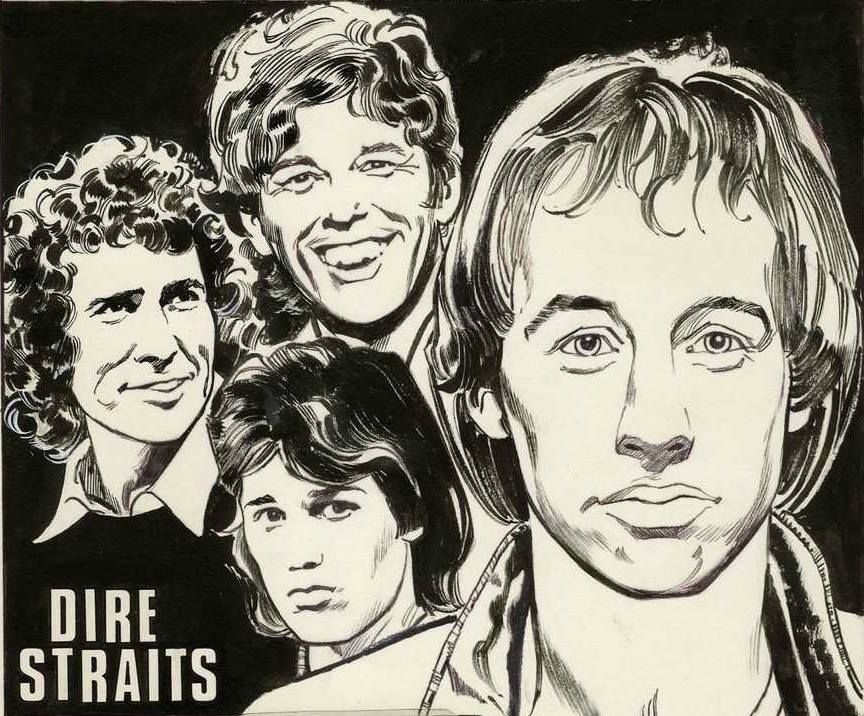
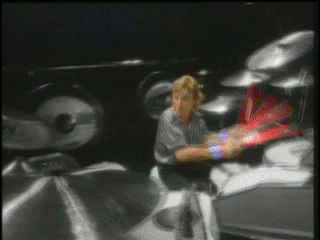 Um dos riffs de guitarra mais potentes de todos os tempos, sem dúvidas, o mais memorável da década de 80'.
Um dos riffs de guitarra mais potentes de todos os tempos, sem dúvidas, o mais memorável da década de 80'.



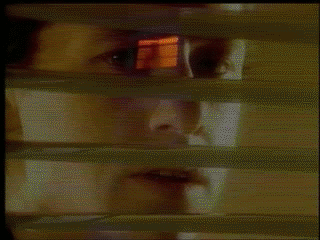 Blinds on the windows and a pain behind the eyes
(Cortinas nas janelas e uma dor atrás dos olhos)
Blinds on the windows and a pain behind the eyes
(Cortinas nas janelas e uma dor atrás dos olhos)






















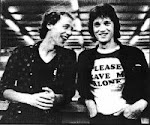

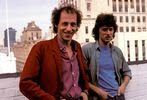


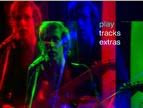
































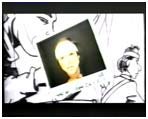
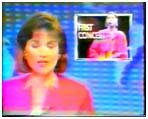


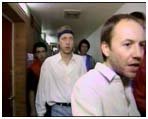
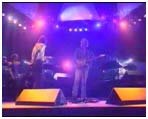


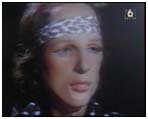



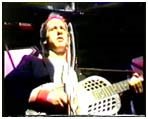



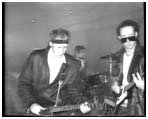
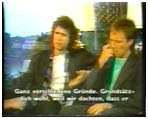
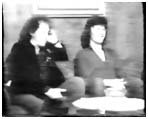


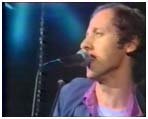
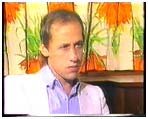

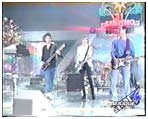
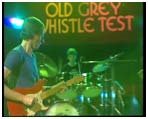
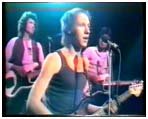
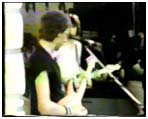
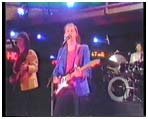


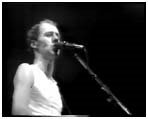
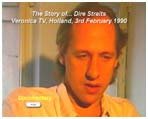


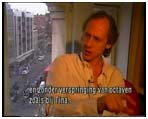

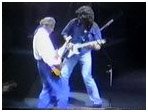
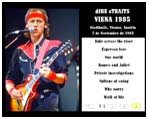

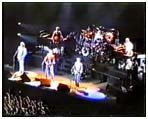

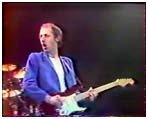
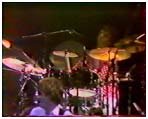
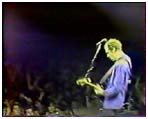
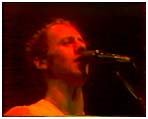

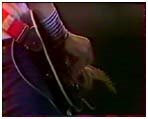
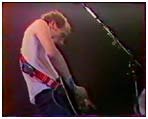
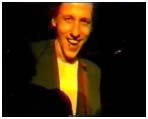
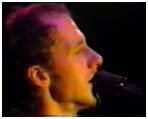
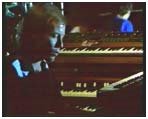
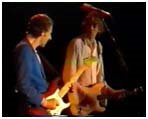


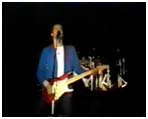
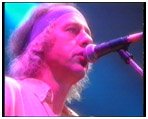

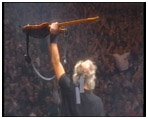

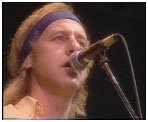
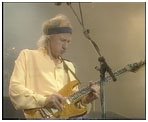
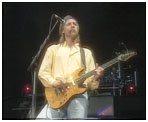
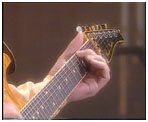
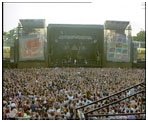
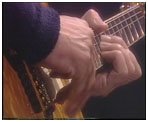
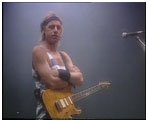

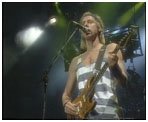
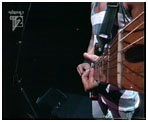


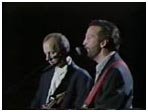

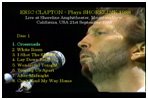


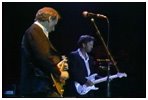
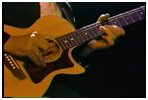
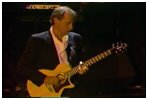



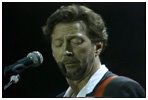


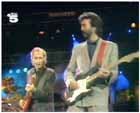

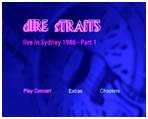
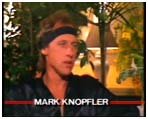
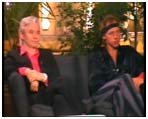





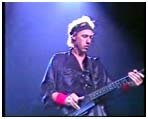
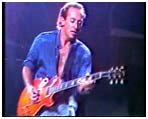
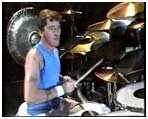
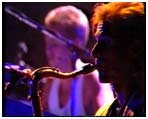
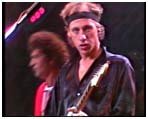
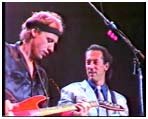
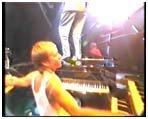




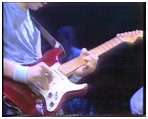
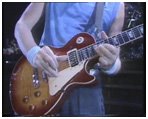


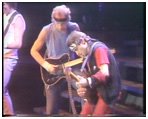
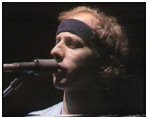

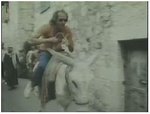
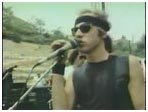
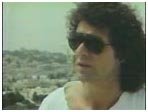

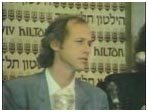


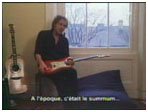
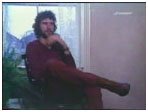

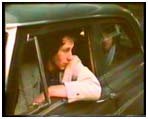

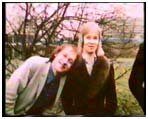

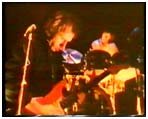
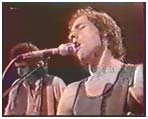

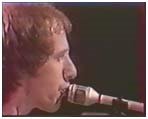
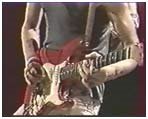

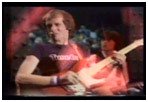


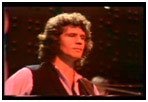
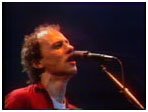
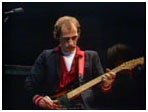
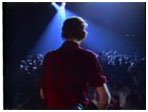
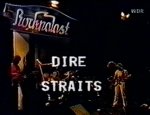


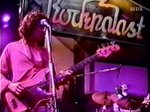

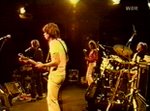
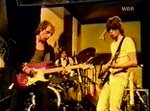







Nenhum comentário:
Postar um comentário